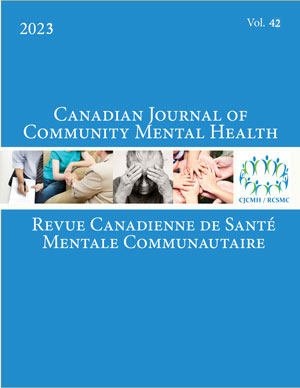Volume 39 • Number 3 • November 2020
Articles
OPEN ACCESS
An extensive body of literature supports the mental health benefits of exercise. Some clinicians are starting to embrace the concept “exercise is medicine.” In our study, we evaluated longitudinal qualitative data from participants with a mood disorder who participated in an exercise program. Recommendations from participants include providing a program that offers a variety of exercise options supported by professionals such as an exercise specialist in a community setting. Researchers and clinicians can take our results into account when designing or running similar programs for people with mood disorders.
OPEN ACCESS
Drawing from the perspectives of 18 youth (characterized as adherent, ambivalent, nonadherent), 13 relatives and 8 clinicians, this qualitative study, using semi-structured individual interviews and a focus group, explores why individuals suffering from early psychosis accept or refuse treatment. Identity and relationships, understanding of the diagnosis and significance given to treatment are key themes. Varying degrees of ambivalence and nonadherence can be seen as normal stages of a process to rebuild their sense of self and construct their identity. A trusting relationship may facilitate gradual resolution of ambivalence, promoting the individuals’ sense of ownership and empowerment in the context of treatment.
OPEN ACCESS
Cette recherche vise à comprendre en quoi les traits d’identité culturelle, plus particulièrement l’ethnicité et le statut d’immigrant, pourraient modifier la façon dont le travail s’associe aux symptômes de détresse psychologique au sein de la main-d’oeuvre canadienne. Les résultats basés sur les données longitudinales de l’Enquête nationale sur la santé de la population (ENSP) de Statistique Canada font état d’un rôle plus important de l’ethnicité en comparaison au statut d’immigrant.
OPEN ACCESS
Few studies have examined a diversity of professionals’ perspectives in providing children’s mental health (CMH) care, particularly for ongoing-complex problems. Based on interviews with 16 primary healthcare (PHC) providers, care for ongoing-complex CMH problems depended on provider interest and scope of practice. Most providers felt PHC is where ongoing-complex CMH problems should be cared for, where providers can emphasize advocacy, coordination, and ongoing monitoring; few felt able to provide this type of care. A comprehensive approach for incorporating PHC with specialized MH services is needed. Defining a care coordinator would be a clear step toward improving collaboration and care.
Practice Innovations
OPEN ACCESS
In response to an emerging substance use crisis in rural Ontario, a Family Health Team initiated the Rural Outpatient Opioid Treatment program. This program includes access to an interdisciplinary team, opioid agonist therapy, counselling, and peer support. Patients report they appreciate the “seamless” integration of medical, social, and peer support.
OPEN ACCESS
AFFIRM, an empirically based affirmative CBT intervention was adapted and delivered virtually to LGBTQ+ youth as a rapid response to their exacerbated mental health vulnerabilities due to Covid-19. Key innovations that enabled the transition to technology-mediated groups—leveraging technology, engaging effectively, and facilitating groupwork—are detailed.
OPEN ACCESS
Instead of simply observing a looming mental health crisis for the front line healthcare workforce in the wake of Covid-19, a community mental health agency in Ontario created a coordinated response by tailoring their services to front line healthcare workers, first responders, and their families to stay ahead of the curve.
OPEN ACCESS
A cognitive remediation group therapy was adapted to accommodate a participant with acquired blindness in an early psychosis intervention program. The modifications facilitated group inclusion and self-reported positive outcomes. This case highlights the need to consider accessibility during treatment design and transitioning therapies from research settings into clinical environments.










